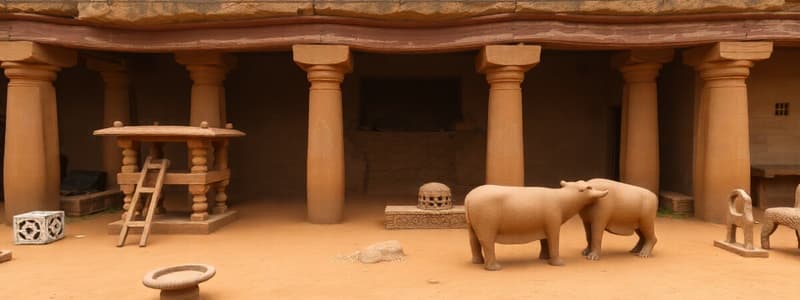Podcast
Questions and Answers
What is the primary focus when analyzing complex problems?
What is the primary focus when analyzing complex problems?
- Engaging multiple stakeholders
- Identifying underlying patterns (correct)
- Data collection and presentation
- Strategy and time management
What role does stakeholder engagement play in problem-solving?
What role does stakeholder engagement play in problem-solving?
- It ensures diverse perspectives are considered (correct)
- It simplifies decision-making processes
- It replaces data analysis requirements
- It reduces information overload
Which strategy is least effective for managing time in complex problem-solving?
Which strategy is least effective for managing time in complex problem-solving?
- Avoiding delegation of responsibilities (correct)
- Prioritizing tasks based on urgency
- Creating a detailed action plan
- Setting clear objectives
In solving complex problems, what is a critical component of data collection?
In solving complex problems, what is a critical component of data collection?
What is a common drawback of relying solely on a single problem-solving method?
What is a common drawback of relying solely on a single problem-solving method?
Flashcards
String
String
A sequence of characters used to represent text.
Atomic data type
Atomic data type
A data type that represents a single unit of data, for example, a number, a character, or a boolean value.
List (Array)
List (Array)
A data structure that stores a sequence of values in a specific order.
Dictionary (Map)
Dictionary (Map)
Signup and view all the flashcards
Queue
Queue
Signup and view all the flashcards
Study Notes
Ancient Indian History
- Periods: Prehistoric, Protohistoric, and Historic periods
- Prehistoric Period: The period before the development of writing systems. Evidence is primarily archeological. Examples include the Stone Age.
- Protohistoric Period: The period with writing but undeciphered scripts. Examples include the Indus Valley Civilization.
- Historic Period: The period with deciphered writing systems. Examples include the Vedic period.
- Source of History study: Archeological finds (inscriptions, coins, pottery, artwork) and literary sources (religious texts, secular literature, foreign accounts)
- Examples of important periods/civilizations:
- Stone Age
- Indus Valley Civilization
- Vedic Period
- Mahajanapadas
- Mauryan Empire
- Post-Mauryan Period
- Sangam Period
- Gupta Empire
- Post-Gupta Period
- Early Medieval Period
- Indian Empires and Kingdoms (during various periods)
Sources of Information
- Archeological sources: Inscriptions, coins, pottery, architecture, sculptures, paintings, etc are used to obtain information about the past
- Literary Sources: Religious texts (Vedas, Upanishads, Puranas, etc), secular literature (e.g., epics, plays, poems), and foreign accounts (reports by travelers, etc) provide insights into societal norms, customs, and the lives of people in the past.
Specific Historical Periods
(Note: No specific details provided for each, use the further notes for reference)
Studying That Suits You
Use AI to generate personalized quizzes and flashcards to suit your learning preferences.




